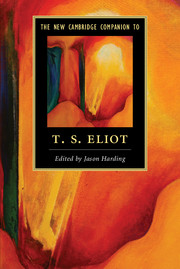Book contents
- Frontmatter
- Contents
- Notes on contributors
- Preface
- Chronology of Eliot's life and works
- List of abbreviations
- 1 Unravelling Eliot
- 2 Eliot: Form and Allusion
- 3 Prufrock and Other Observations
- 4 Banishing the Backward Devils: Eliot's Quatrain Poems and “Gerontion”
- 5 With Automatic Hand: The Waste Land
- 6 “Let These Words Answer”: Ash-Wednesday and the Ariel Poems
- 7 Four Quartets
- 8 “A Precise Way of Thinking and Feeling”: Eliot and Verse Drama 116
- 9 T. S. Eliot as Literary Critic
- 10 T. S. Eliot's Social Criticism
- 11 Gender and Sexuality
- 12 Eliot's Philosophical Studies: Bergson, Frazer, Bradley
- 13 “Anglo-Catholic in Religion”: T. S. Eliot and Christianity
- Select bibliography
- Index
- Miscellaneous Endmatter
3 - Prufrock and Other Observations
Published online by Cambridge University Press: 01 December 2016
- Frontmatter
- Contents
- Notes on contributors
- Preface
- Chronology of Eliot's life and works
- List of abbreviations
- 1 Unravelling Eliot
- 2 Eliot: Form and Allusion
- 3 Prufrock and Other Observations
- 4 Banishing the Backward Devils: Eliot's Quatrain Poems and “Gerontion”
- 5 With Automatic Hand: The Waste Land
- 6 “Let These Words Answer”: Ash-Wednesday and the Ariel Poems
- 7 Four Quartets
- 8 “A Precise Way of Thinking and Feeling”: Eliot and Verse Drama 116
- 9 T. S. Eliot as Literary Critic
- 10 T. S. Eliot's Social Criticism
- 11 Gender and Sexuality
- 12 Eliot's Philosophical Studies: Bergson, Frazer, Bradley
- 13 “Anglo-Catholic in Religion”: T. S. Eliot and Christianity
- Select bibliography
- Index
- Miscellaneous Endmatter
Summary
In 1917, T. S. Eliot published “Eeldrop and Appleplex,” a prose dialogue between two figures modelled on caricatures of himself and Ezra Pound. Eeldrop is Eliot:
“I test people,” said Eeldrop, “by the way in which I imagine them as waking up in the morning. I am not drawing on memory when I imagine Edith waking to a room strewn with clothes, papers, cosmetics, letters and a few books, the smell of Violettes de Parme and stale tobacco. The sunlight beating in through broken blinds, and broken blinds keeping out the sun until Edith can compel herself to attend to another day. Yet the vision does not give me much pain.”
(CP1 530)Eeldrop's test follows from a remark Appleplex makes about Edith: “‘Everyone says of her, “How perfectly impenetrable!” I suspect that within there is only the confusion of a dusty garret’” (CP1 530). Eeldrop picks up on Appleplex's “dusty garret,” but he is less explicit about the distinction between what may be within Edith's person and what may be around her; where Appleplex speculates about the kind of room within Edith's person, Eeldrop imagines her placed within a room. The expression “waking to a room” (emphasis added) slightly alters the expected prepositional locution of “waking in a room.” As Eeldrop phrases it, Edith wakes to her setting, as if, say, waking to remorse. The specific moment of regaining consciousness is temporally afloat, as if part of Eeldrop's test is to imagine the act of waking in order to speculate when, and how, a person and the world may come together, but also to show the difficulty of locating any such finite place or time when a sharp distinction might be drawn between a person and the world. Edith wakes to a setting which is itself a threshold in the double aspect of the sunlight beating in and being kept out: the broken blinds recall the shaded peripheries between figures, rooms and worlds in Eliot's “Preludes,” where the “showers beat / On broken blinds,” and where “the world came back / And the light crept up between the shutters” (CPP 22, 23).
“Rooms,” “scenes,” “atmospheres,” “situations” – these words repeatedly play a part in Eliot's early poems and critical prose: “the contact and cross-contact of souls, the breath and scent of the room” (CP1 488).
- Type
- Chapter
- Information
- The New Cambridge Companion to T. S. Eliot , pp. 41 - 54Publisher: Cambridge University PressPrint publication year: 2016

